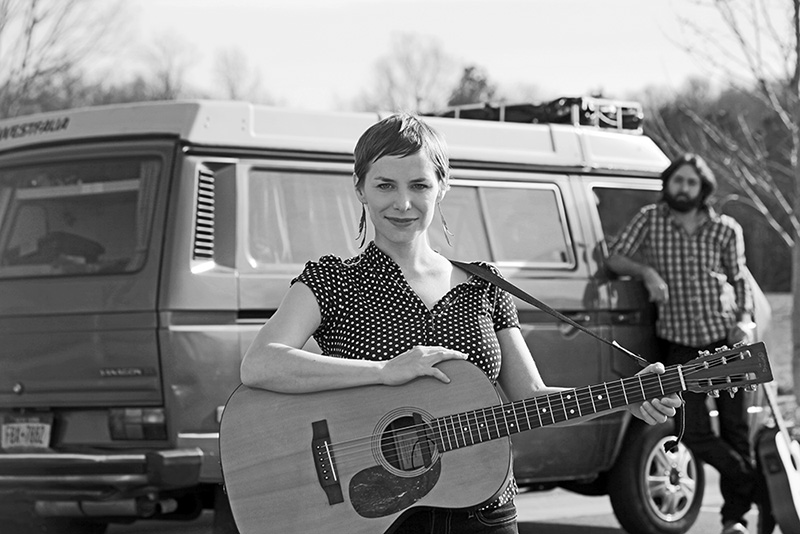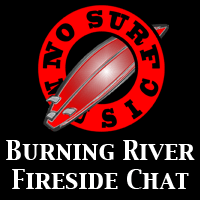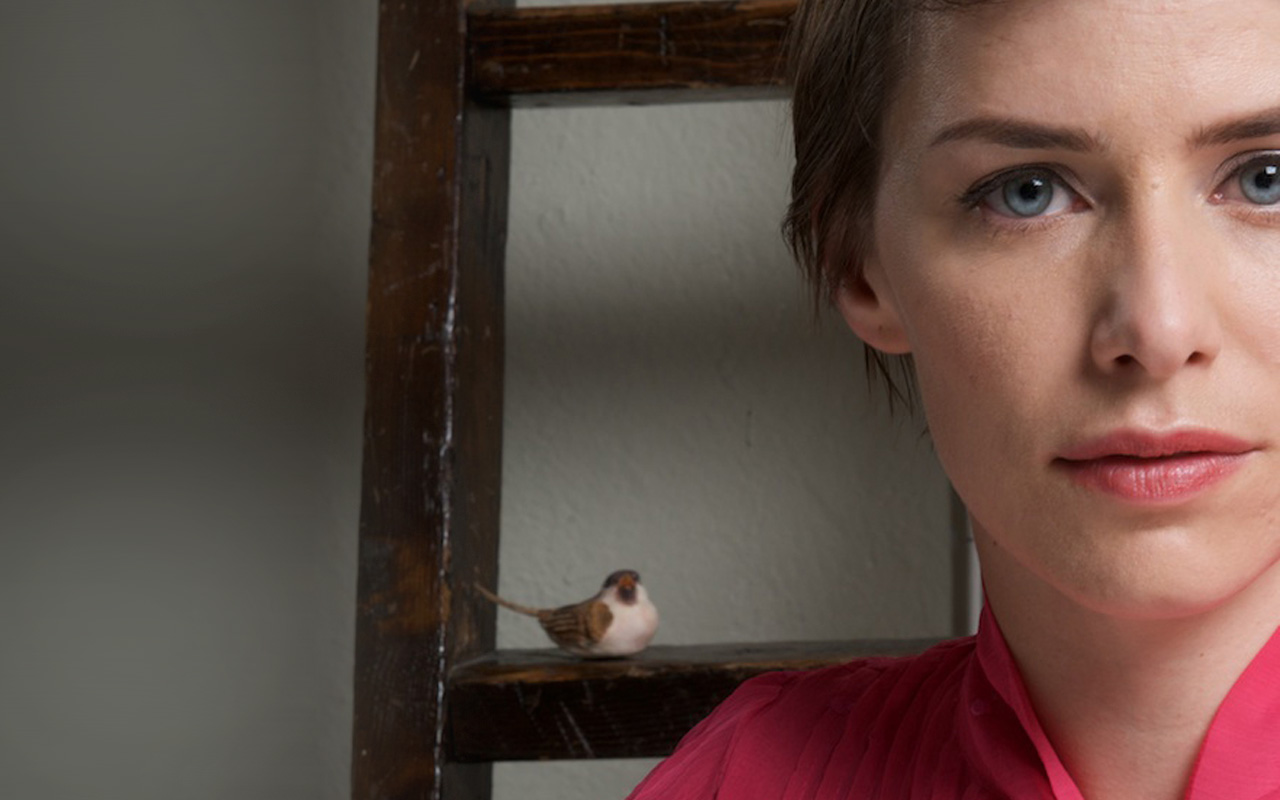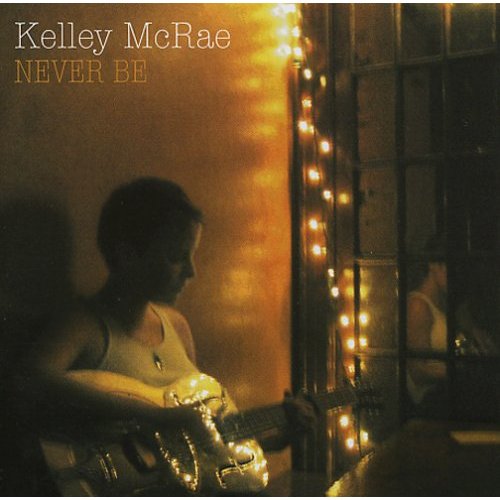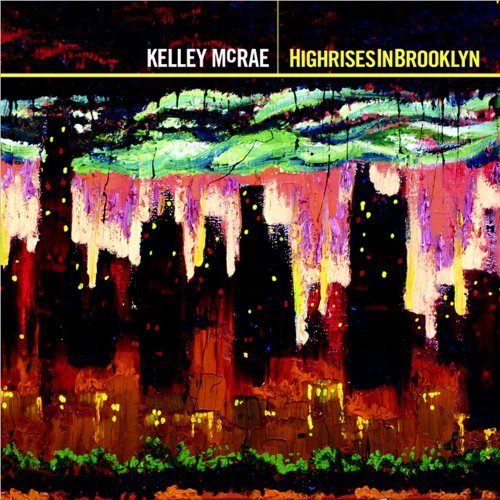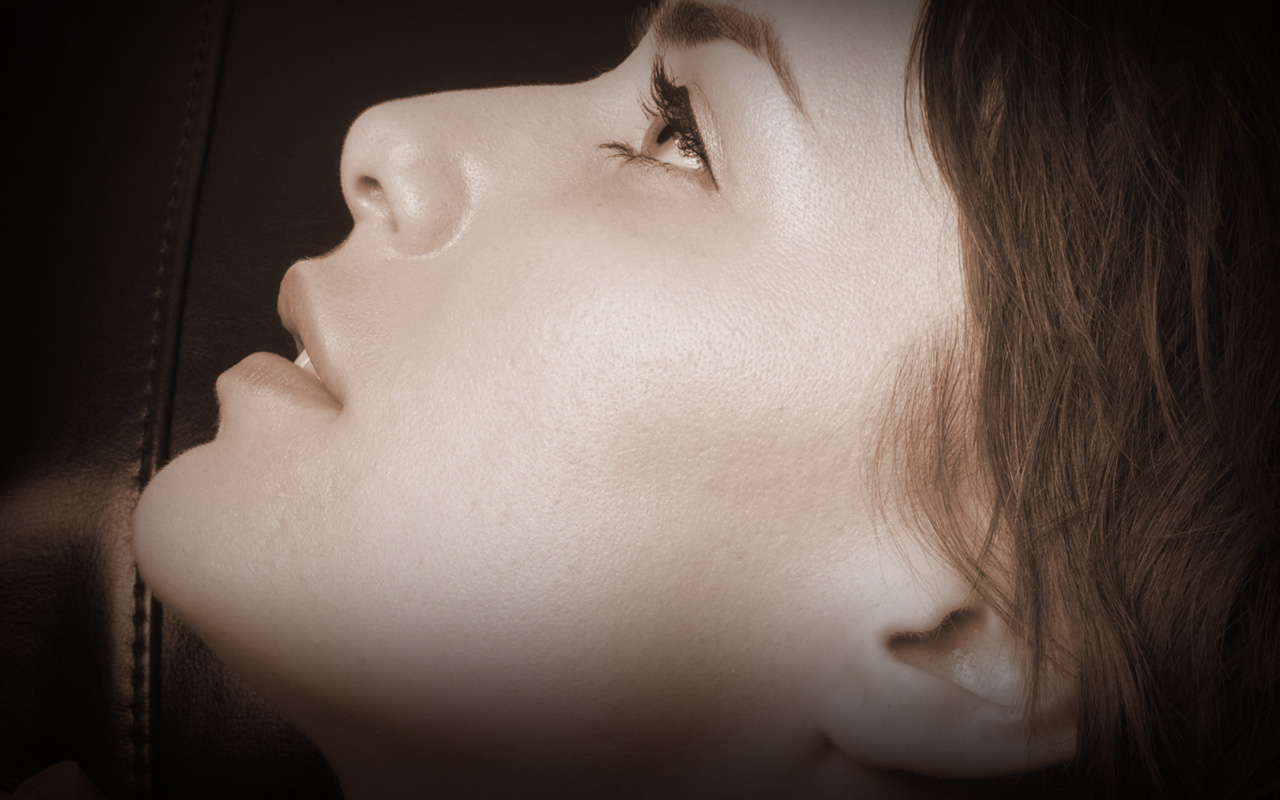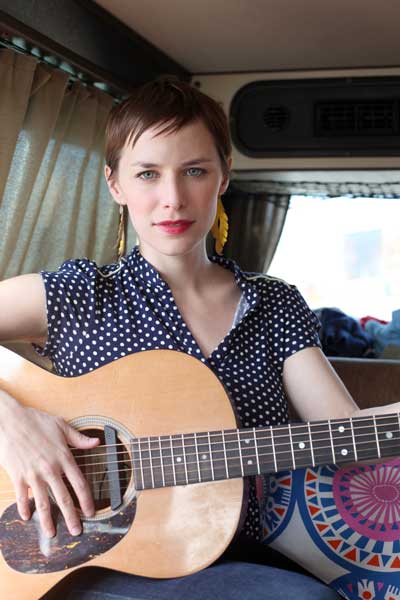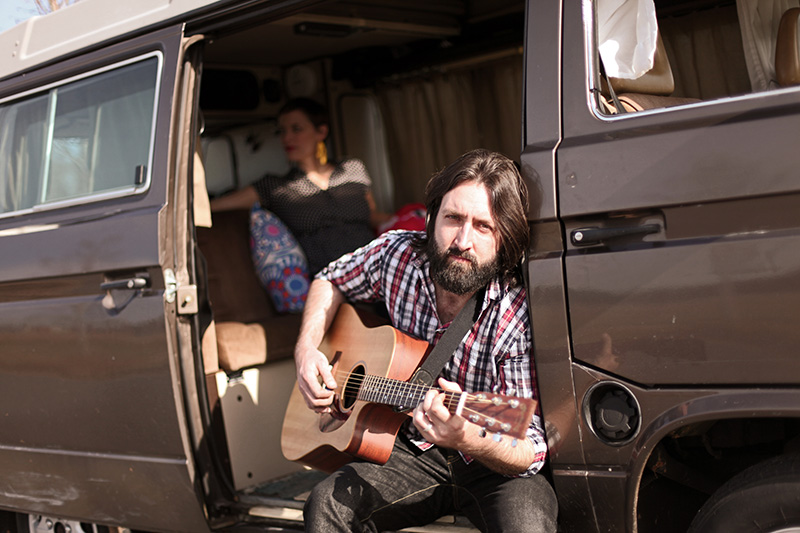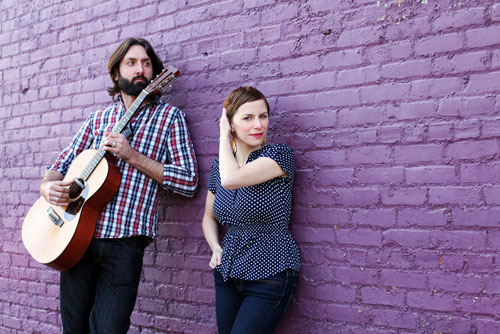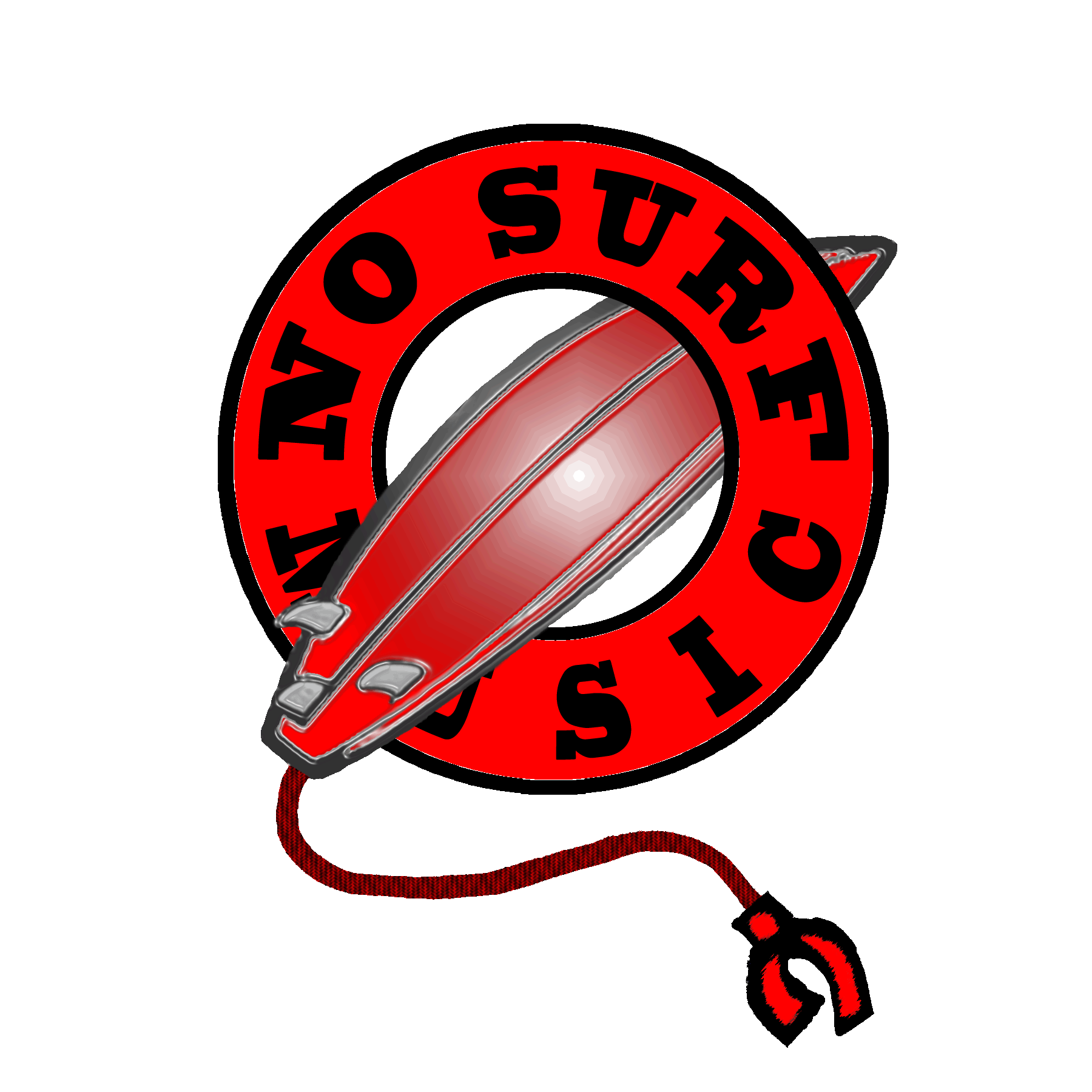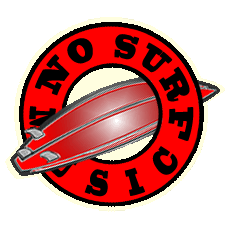
The Lowdown:
June 16, 2011
Kelley McRae: with Kelley McRae and Matt Castelein
by Jason D. 'Diesel' Hamad
Kelley McRae and Matt Castelein take a break from their travels in the vessel Proč Ne, a VW Camper Van that also serves as their home away from home. Kelley is the one without the beard. Photo by Georgina Emily Photography LLC.
Kelley McRae is the perfect person to kick off the Burning River Fireside chat series because she’s the reason we founded No Surf Music. Well, not her personally, but she’s a terrifically talented independent artist who just isn’t that well known. Yet.
Kelley’s determined to change that, a few dozen people at a time. Recently, she went all-in, quitting her job, giving up her apartment, selling everything she owned and embarking on an adventurous tour living out of a big brown VW camper van named Proč Ne (Czech for “Why not?”). Along with driver/guitarist/husband Matt Castelein, she’s crisscrossing the highways and back roads of America, stopping to play anywhere that will have her. The bulk of their gigs consist of house shows, small, intimate gatherings perfect for getting to know both her and her music. Along the way she’s building a devoted and ever-growing fan base.
On their way down I-80, Kelley and Matt stopped in beautiful Kent, Ohio, just a block away from the river for which this series is named. On a nice, sunny spring day, we spent the afternoon digging deeply into her music and their life on the road and talked about everything from her tomboy childhood to how graffiti inspired what may be the greatest song you've never heard.
Lots of great stories just didn't make it into this article. If you want to hear the interview in its entirety, click here to stream the podcast or right-click/option-click to download!
No Surf: Thank you both for stopping by. So you’re currently driving through Ohio going from Pittsburgh to Michigan. How long have you been on the road and how’s it going for you?
Kelley McRae: We’ve been on the road for about three months now. It’s going great so far. It’s been amazing. We left New York the last weekend of February and since then we’ve played about 50 shows and driven…
KM & Matt Castelein (together): …twelve thousand miles…
KM: …you know all the way from Boston to Austin, Texas through the Southeast, Florida, back up the East Coast and now we’re hoping to make it out all the way to California. That’s the plan. If the van will last that long.
MC: Ohhhhhh, don’t say that…
NS: You don’t want to jinx it. Speaking of which, I did ride over here in the lovely VW van for which your tour is named. You have a sponsor now, and I know that you’re contractually obligated to throw a little something in… but it really is awesome because anybody who supports independent music is completely cool.
MC: Aw, man. It’s so great.
KM: Totally agreed.
NS: So why don’t you tell us how that came about and who’s sponsoring the tour?
KM: We’re sponsored by a company called True Lemon. They basically take a lemon or a lime or an orange—it’s an all-natural product—and it’s like a powdered lemon in a packet. Their whole motto is Live True. I contacted them about the idea of sponsoring this tour and doing a little guerrilla marketing campaign for them and they were totally up for it, so we started this sort of unusual partnership that has been amazing.
NS: You grew up in a small town in Mississippi, I do believe, and I feel like that had a lot to do with forming the basis of your music and your lyrics. So tell me a little about what it was like growing up down there, how you got into music, and how those experiences have affected what you’ve written.
KM: I don’t know what it’s like for kids growing up anymore, but back then we just had free reign. My mom would send us off in the morning in the summertime and we came back for dinner. We lived by a lake and some woods so we spent the whole time just running around, building forts, writing plays and putting on neighborhood boxing tournaments and such.
NS: Were you a contender?
KM: I wanted to be, you know? I was such a tomboy and I had two brothers, and we would literally put bricks in a red wagon and tie a rope around our waists and run down the street training. But I was just a little thing that wanted so badly… I was actually notorious for breaking all our sports equipment because I would get so angry that I would never win.
It was a really beautiful place to grow up. It was just gorgeous and green. Like I said we had a lot of freedom. Also it was a university town so we had access to really great teachers, so growing up I got to take piano and dance and voice and all these things and the teachers there were amazing because they were connected to the university.
You got to do the whole big fish in a small pond thing, so all during high school I got to be in all the plays and all that. I just got a ton of experience and a ton of encouragement. Once you go off into the real world and it’s 10 years later and you’re still doing the thing, to have come from that level of encouragement is amazing. But I also always knew that I wanted to end up somewhere like Brooklyn. I never felt like Mississippi was… I don’t know… I just always felt like odd man out.
Big blue eyes and a small brown bird (you'll learn more about her bird friend later). Photo by Chris Pereira.
I actually studied acting. I thought I wanted to be an actress. I had never considered music as a profession even though I’d grown up singing in church and all the three part harmonies with that. So I went to school at SMU in Dallas, Texas for acting. Then my junior year I had to take an arts elective class and I had this guitar that I’d never played, so I was like “shit, I’ll finally learn to play this guitar.”
It was a classical guitar class and I was actually pretty terrible at it, but once they taught us three chords I was totally obsessed. I spent every free moment that I had writing songs and playing and singing.
My poor roommates at the time heard so many terrible, terrible songs. I always liked acting and I even probably thought I loved it, but once I started music, it was very clear to me, oh, no… it’s like dating the guy who you kind of like and meeting the dude that you love… Like “oh, right, that’s the difference!” So once I graduated I pretty much knew that even though I had this acting degree I wanted to do music.
NS: Let me ask you about some of those early songs, which I’m sure weren’t as horrible as you think they were…
KM: They where pretty terrible, actually. I still have the demos.
NS: Well, this is the beautiful thing. Everyone goes through a growing process. But what where some of the first things you wrote about?
KM: Oh wow. I wrote about relationships or the lack thereof. I was listening to Patti Griffin like a mad woman so that well of loneliness that she draws from was so home to me. And songs about growing up in Mississippi… those images have always been a theme. It was actually very similar to my music now in terms of just relationships and spiritual themes and loneliness themes. It was pretty much the same thing… just hopefully the quality control has gotten significantly better.
NS: It definitely sounds like you carried a lot of that through. I just want to focus on your first album Never Be for just a moment. Where were you living when you completed it? Were you still in Mississippi then or were you in TX?
KM: No, I was actually in New York City. The weird thing that happened when I moved to New York was… I sort of was thinking of it as grad school for songwriting. I tried to surround myself with songwriters who were better than me.
NS: Fair enough. That’s a lot of what the New York experience is, just meeting people.
KM: Yeah. Totally. Go to shows all the time; end up in those little corners of bars sharing songs till 4 a.m. So I was trying to dig pretty deep into what my sound actually was, what my identity as a songwriter was, because at the time I had this weird, like, “Alanis meets a theater major singer” and I was really trying to get back to “what did I sound like when I was seven and I was singing just for the joy of it?” And out of that process it sort of became clear that the things that really resonated with me were the Southern… whether it was like a gospel or a soul or a country kind of vibe. When I started to write in those veins, that’s when I started to write songs that went to that next level of feeling true. So it wasn’t until New York City that I really sort of found the Mississippi in my music.
NS: I guess this would be a perfect time to talk about that transition then, because it must have been a huge one going from your earlier experiences in small towns and college towns to New York, and especially to Brooklyn, which is maybe not as densely populated as the city itself but is just so lively and so filled with all sorts of different people. What was that like just as a person going through that experience?
KM: I really, really loved it. I almost immediately fell head over heels in love with New York City. And it also is such a kick in the ass. It asks so much of you from an emotional point of view and a daily interaction with people point of view and a financial point of view that anything you put on the back burner in terms of who you are as a person just gets thrown to the front just because you’re so raw. So it was a combination of these ultimate highs of meeting all these incredible people—these super-talented people—learning so much, and also like real lows of can I even survive in this city, you know? But I really loved it and I was really drawn to that diversity of meeting tons of different people with tons of different ideas about life and everything else. It was really a feast and I went for the gusto. It was a great time.
NS: If it took you getting to Brooklyn to find the Mississippi in your first album, a lot of your second album, Highrises in Brooklyn, was about the city itself… the BQE, walking home late at night from bars, all off that stuff. Yet it still retains a lot of that earthy feel and it’s obvious that you’re still who you are no matter where you are. What was it like for you writing about a new place and trying to get those experiences out and why did you decide to do so much of it focused on where you where living at the time?
KM: Once I finished Never Be I wasn’t like “oh, well now I’m going to write my Brooklyn album.” It definitely just organically came out of the things I was seeing and hearing and where I lived… literally the BQE was outside of my window. And I also had a friend who was kind of kicking my ass in terms of songwriting… not relying just on emotions but really digging into the imagery. So I was definitely trying to put those tools to use. That’s what was all around me. And I was going through a sort of terrible relationship, so that rawness and that grittiness of that imagery you see and the people you see started to take on how I was feeling. And what I wanted to do was sonically try to reflect all of that noise… New York’s in a constant state of rumble, whether it’s the subway or the BQE or the bar that you live on top of… somehow reflect both the melancholy that I was in but also the energy of this city that's constantly moving.
NS: Who would you say your biggest influences have been?
KM: My biggest influences tend to be female singer-songwriters who do have that roots-centric music, like Gillian Welch and David Rawlings and Patti Griffin… Lucinda Williams is a huge influence and I want to make her even more of an influence by actively listening to her stuff a lot… but I also grew up listening to Aretha Franklin all the time, and Bill Withers… We listen to a ton of Neil Young… and a guy named Richard Buchner I’m just a huge, huge fan of. Uncle Tupelo. It’s sort of a combination of these really strong female songwriters and a bunch of other people, soul and country and that sort of thing, but they all tend to be in that Americana kind of vein.
NS: Well, I would say the R&B stuff really comes through in your voice. To me that’s one of the most interesting aspects of your music. For the most part its very rootsy music, but your voice is just so beautiful and bluesy. Do you feel like you got a lot of that listening to those 70’s recordings of Aretha Franklin and things like that?
KM: Oh, totally. I woke up every day in 7th grade and played Aretha Franklin’s Greatest Hits tape and then even in high school I sang En Vogue every second I had. I wanted to be a frikkin’ soul singer from the 70’s. It obviously wasn’t gonna happen… I’m a little white girl… but it definitely influenced the music that I write and that I love to sing.
Highrises was interesting because each song is so clearly a different influence. It’s sort of me trying to find who am I as a songwriter. It’s interesting now to try and go that next step. We’re playing a ton of new stuff on the road and trying to still take those influences but to put them more so into a song that “this is my own thing… this isn’t my Aretha rip off song.” I think that’s always a challenge as a songwriter, really finding your own voice but always going back to that well. And with somebody like Aretha Franklin or Lucinda Williams that well is never going to go dry. It’s just super rich stuff.
NS: I’d like to ask you a little about Lucinda, because she’s one of my personal favorites and without a doubt I think she’s one of the greatest poets of her generation. I definitely hear her influence in your writing. You might not be as dark as she is sometimes… it’s pretty hard for anybody to be that dark and still be alive… which is one of the things I love about her, that she can channel those emotions so well. That’s one of the things I see of her in you, that ability to channel emotions, and also, of course, the Southern writing and style. What do you think is the most influential part of her music and her writing on you?
Kelley looking particularly rapturous. Talking about Lucinda does that to me, too. Photo by Chris Pereira.
KM: When I was talking about that conversation with a friend who was sort of telling me “you need to quit talking about how you feel and start talking about what you see around you and let the emotions come through that,” Lucinda was a person he mentioned. He was talking about the song “Concrete and Barbed Wire” on Car Wheels on a Gravel Road and he was like “there’s such a simplicity to her choruses.” She may just say “concrete and barbed wire” over and over and over but damn, you know what she means. I think what I’m trying to take from her is not only that poetry, but also I think I can be very lyric heavy… I would love to be able to do what a soul or a gospel singer or a Lucinda sort of blues-based singer does, which is take a really strong image and let that carry a whole chorus, and I don’t think that I’ve ever done that. Simplicity is the hardest thing to achieve.
MC: What she can do even musically… it’s just a simple idea [hums a rhythm], and she just starts singing. Simple ideas, but powerful.
KM: And she has the benefit of that growl. She can say anything and it would sound badass. So yeah, I think the simplicity and the strength… and that she’s not afraid to kind of be mean… just tell it like it is. I think it’s really refreshing to hear a woman do that, too. It’s really incredible the way that she does that. I would like to work some of that in… Let go of the Southern “always be nice to everybody, never hurt anybody’s feelings”… which may be great in life but doesn’t necessarily always work in art.
NS: One line that stands out to me in that respect, talking about her, is “Joy.” Just those lines about…
KM: “You took my joy. I want it back.”
NS: More than that, “You’ve got no right to take my joy. I want it back.” Just hearing that from a woman is such an interesting feminist statement.
KM: Totally.
Kelley performs a beautiful duet version of "Sparrow" with Andrew Rose Gregory.
NS: In your writing I see some similarities—if maybe more toned down—which brings me to the first song I’d like to ask you about, “Sparrow,” off of Highrises in Brooklyn. It’s an amazing song. The lyrics are absolutely beautiful and it’s one of the most raw things that you’ve written. I know you said you were going through a breakup at the time and I feel like that is sort of the encapsulation of your feelings at that moment. Can you tell me how that came about and what you were doing when you wrote it and why you did?
KM: Yeah. So I was living in Williamsburg in Brooklyn and I was going through a breakup and going through those feelings that go along with that and I had a roommate who was as well and another dear friend. I think through the conversations we were having those images of something like a sparrow or a whore or a burden or an anchor, all of these things started to come through and I wanted to take the leap of writing something that intense. And it was for me as a songwriter kind of a leap to be able to be that raw and it was sort of a challenge to myself to go there. But I don’t even remember specifically writing the song. I just remember sharing it with those two different women.
And I think also there’s the theme of longing for a home that never really felt totally right, which is Mississippi. I‘m always drawn there and I love the people there--there’s something about the green, the space and the air—but it never quite felt like home. So there’s all these imageries of this tension of what it feels like to be in that place that came through.
NS: I want to make one comparison and see if you agree with me. You know Kasey Chambers?
KM: I love Kasey Chambers.
NS: That is a great point in your favor. In some ways that song reminds me of “Not Pretty Enough.”
KM: I used to cover that song.
NS: Did you? Then I think you can see emotionally where I’m coming from on that. She has gone through a lot of changes in her life since then, as have you since you wrote that song. Hopefully most of them for the positive in your case…
KM: Yep, I would say so.
NS: That’s good to hear. But when she came out with her newest album Little Bird she basically did an answer song, the title track, which is sort of what she in this place in her life would say to the girl at that period in her life. If you were going to talk to the girl who is writing “Sparrow,” what do you think you would say to her?
Van, home, practice space, Proč Ne does it all. Hey, that looks like a comfy pillow. Funny how you didn't offer ME a pillow when I rode in her. Photo by Georgina Emily Photography LLC.
MC: That’s a good question.
KM: [staring off into the distance] Wow! That is a great question.
NS: That’s why I do this professionally, my friend.
KM: [laughing] No, that’s a really great question, and in fact, I feel like I’m going to write that song now and I’m going to have to be like giving you props on the album. Man, I don’t even know. I feel like you just planted the seed for the answer that’s going to have to come out.
MC: I think I’ve thought about that but never actually put that together. Like when I’ve been listening… What do you think now when you’re singing it?
KM: But you know what’s interesting… I feel like so many of these new songs are that. And it’s why it’s been kind of hard to write them because for so long I drew from that well of loneliness and from that well of even sort of enjoying loneliness.
There’s a level to which there is that person in New York City, which I’m sure is everywhere, that sort of is masochistically looking for those relationships that are just gonna to be terrible.
NS: I think I dated a few of those…
KM: [laughing] Exactly. And you’re in the bar and there’s a romanticism about it all and you’re in the city and you’re walking home… and so, man, I really drew from that well and enjoyed it, and it was also totally shitty.
NS: Well, it’s that sick sort of basis that Lucinda has, too.
KM: Yeah, it’s like how can she still be writing these songs?
But I think to start to make those choices in your life where you’re saying “You know what, this is no longer working and I don’t want to be in this place anymore” and to actively seek out breaking those patterns… what’s funny as an artist is to be like “how do I continue to write songs when I’ve sort of depended on this one way of writing?” And so I think that’s what we’re trying to do all the time.
We just finished this song called “Brighter Than the Blues,” and it’s that idea of something being more important than those blues that I loved so much, and so I think in a way that’s sort of a response. It’s not a direct response, but this idea of something being more important than my own melancholy that was driving all those songs, and choosing light and choosing love over melancholy. And being able to write into that space as well, which can be kind of scary, because if you’re an artist who’s depended a lot on that and built a fan base out of that, to try new territory is an interesting thing, but also a necessity.
Video Blog #5 feat Kelley McRae from Randy Scott on Vimeo.
Kelley and Matt perform her song "Johnny Cash."
NS: In addition to “Sparrow,” you’ve got a number of other great songs, but I think there’s one that really stands the test of being just one of the great songs that’s ever been written, and that’s “Johnny Cash.” It’s tremendously beautiful, and I want you to talk a little about that, how you got that seed planted in your mind about his relationship with June and why you decided to let that seed grow into the song that it did.
KM: Well, I was talking a little bit about when I moved to New York City thinking of it as grad school for music, and part of what I started to do was listen to a lot of the old-school country that I had never listened to that much growing up, like Johnny Cash and the Carter family, and I think part of that began in that process of just listening to that music.
Then I’d heard a little bit about their relationship and was always fascinated by it—and this is before the movie or anything like that. She died about four or five months before he did, and everybody was really surprised because Johnny had always been in and out of the hospital.
So when he passed away—it was about a week or two after he had died—I was walking through Williamsburg near the East River. There were all these abandoned warehouses that now have been turned into giant condos, but at the time it was still a pretty abandoned area, and someone had written in spray paint, graffitied on the side of this building, like 30 feet long, “Johnny Cash died of a broken heart.” And I just like stood there looking at it for a while and walked home and just knew I have to write that song.
The seed was definitely planted there since that’s the first lyric of the song. I was working as a receptionist at this place in Chinatown and I was sent on an errand to Staples or whatever, and a lot of the writing that I did in New York City would just be walking around, and I wrote it on the way to Staples. I think probably that same week.
NS: Did you buy some extra envelopes and write it on the back of one?
KM: No, I think I just even had it in my head and didn’t even write it down, which is ridiculous.
But I had written a short story and there was a character in it that was basically me as a little girl, and so it was from her perspective… this Southern town. So it was a bunch of different things, but mainly the graffiti and some pieces that were already floating around.
NS: What is your personal favorite composition?
Kelley rocks the pixie cut and sings the blues, performing "Time."
KM: I definitely love those two songs mainly because they speak to so many people. Especially touring, I’ve had so many people come up and tell me that “Sparrow” helped them or helped them articulate how they feel to someone they love, which is always incredible.
But I think the song I enjoy performing the most these days is a song called “Time,” which is the first song on Never Be. When you’re singing songs night after night, they either start to fail you or they start to grow. And I think if they’re strong songs—like a “Johnny Cash” or a “Sparrow”—there’s always something there that it’s going to give you. And “Time” has just grown and grown and grown and become it’s own thing. It’s a joy as a performer to have that there night after night.
NS: Talking about what you’re doing now and going towards the future… I think this is one of the more interesting tours... I spend a lot of my time dealing with… let’s say smaller bands, and one of the things that I think is great that has really popped up a lot is the idea of the house concert as a way to build…
MC: Oh, man, it is a huge difference maker. And it’s something we talk about a lot with people, because it is new and it’s a thing that’s gaining a ton of momentum everywhere. We live in a DIY world more than ever now, right? We’re all so well connected, we can do anything we want, to the point where we can book our own tour and the reason why is the house show.
KM: Yeah, I’d say 75% of the shows we do are house shows.
MC: When you roll in, you never know where you’re rolling into, which is pretty fun. You never know who you’re going to meet. And you’re going to meet people, you’re gonna hang out, you’re going to be able to play as long as you really want to. You can do whatever you want.
KM: Part of what I love about this tour more than anything is you just get to see places and meet people that you would never get to meet in any other scenario.
MC: And it just makes it all possible because we’ll be like, we played a venue last night in Pittsburg and we’ve got a show in Chicago… how can we get there? And you could try to book venues, but…
KM: …if you’ve never played a town before…
MC: … what’s the point? But if you can do the house shows you can play for…
KM: …thirty people who would have never come out to a venue, but because a fan is hosting and they’re like “no, really, you gotta come”…
MC: And especially with this music it really works because it’s lyrically based…
KM: …it’s acoustic…
MC: …there’s stories to tell between songs and people want to know more. It all goes together very cohesively.
KM: And I love that this is how people used to listen to music all the time. It’d be like a Saturday night, before the television, you’d come over and somebody’s on the piano… I love that idea and we’re kind of doing that.
MC: We played in Connecticut for a woman who was in the folk scene in the 60’s with Dylan and Joan Baez and she was saying back in that era in New York City everybody was going to each others’ apartments and playing and they would just pass the guitar around, and she was like “oh, this is a throwback. This is the way it used to be.”
NS: Well, even going back a little bit farther than that, I personally love Woody Guthrie… the stories about the Almanac House when he and Pete Seeger and Lee Hays and all those guys were all living together in the village and they couldn’t pay their rent so they would just hold hootenannies, just invite all their friends over, put out a hat and play all night…
KM: That’s what we’re doing, man!
NS: Exactly! Those are the guys who started it. So much of what we think of as being reinvented now was really invented by those guys.
MC: And the great thing, too, is you roll into places where people don’t really know their neighbors and the neighbors will come out to see what’s going on…
KM: All the sudden there’s a community there where there really wasn’t before and that’s really cool.
Matt strums a little while Kelley chills out in the back of the van. Photo by Georgina Emily Photography LLC.
MC: People are starving for that in certain places. That’s why we love New York… because you have this sense of community throughout the entire city. So you roll into a place like Memphis, Tennesee, where people are really wanting to redevelop downtown and they really want to bring in artists and have their friends come over, and this is the perfect way to do it, a house show.
NS: Yeah, I lived in a building in Spanish Harlem for like a year and a half and never met any of my neighbors, and then the blackout happened and that’s when we all got together. We were all sitting out on the front stoop and I had an antique gas lamp and just filled it up with kerosene and there was a party down in the projects, they had the boom boxes out… It was the same kind of crazy experience.
KM: That’s the spirit we want to rekindle everywhere!
NS: Well what you need to do is knock out the power on the entire Eastern Seaboard…
KM: [laughing] That’s a actually a good idea…
NS: So how did you guys meet and how did you decide to start playing music together?
MC: I met Kelley at a show…
KM: …at Pete’s Candy Store in Brooklyn. And then we started dating when I was in Chicago recording Highrises in Brooklyn. I was there for about a month. And then we got married.
NS: So did you guys start playing together first or where you dating first?
MC: No, no, we were dating first.
KM: We actually didn’t play shows together at all until after we decided to do this.
MC: I was always doing my thing. We would play in the living room together. But Kelley had a band… I mean she was recording her second album when I met her.
KM: But then once we decided, like, hey, let’s get rid of the apartment and see how much music we can play, and we started doing shows together last fall. So it was like a brand new band hitting the road, so it’s been awesome to play show after show and get better and better and have it grow into more of a cohesive kind of thing, and writing together more… and Matt’s coming musically from a pretty different place so it’s been an awesome balance for me to bring in some of those influences, and vice versa, hopefully.
NS: Well, I think the way that you’re doing this has really been incredibly brave, and I have to give you props for that. Anybody who goes out on a limb for their art is absolutely amazing.
KM: It was funny, because the more we decided to like, go in further, in terms of like, “no, let’s live in the van and let’s sell everything we own, and let’s not have an end date” the more fun it got and the more the crazy stuff started to happen. Once we actually just jumped off the cliff, the parachute landed on our back. I think there’s something to that. When you really decide to step out into something you really love things can come along, and we’ve encountered so many generous people.
MC: And everything was right, the timing was just perfect for you…
KM: Yeah, I had been building this network for seven years. We meet kids along the way who are like “aw, I want to live in a van. I want to do it tomorrow.” And we’re like “yeah, well, except…”
NS: There are a few excepts there.
MC: But we’ve also met a lot of people that are in similar situations and making it work.
KM: That’s totally inspiring. You know, six years in or whatever, and you’re like “ok, we can do this.”
NS: Well, I’m sure if anyone can make it you guys can. Let me give you a tip, when you finally make it out to the Pacific Ocean, make sure you wear your flip flops, but the showers at the Santa Monica Pier actually aren’t that bad. It’s a great place to stay right by the beach.
KM: Excellent. I like that.
NS: What’s the future hold? I know you said you’ve been writing some new songs and you’re playing out, but it has been a while since your last album came out. Are you looking to get into the studio anytime soon?
KM: It has been a while. I promised myself the last time I recorded and toured that if I had the chance I wanted to tour with the songs before I recorded them, just because inevitably you get to the end of a tour and you’re like “oh, ok, that’s how I’d record that song.” So it’s been a real privilege to be able to work these songs out. I’m hoping when we land somewhere at some point—and hopefully not too far away—to start recording that third album, which I’m also hoping will be much more a representation of the live show. And then I just want to keep touring as much as possible and see the world. That’s the plan.
NS: Take the van, ship it to Europe…
MC: We can put skis on it and just try to go across the water. Somebody’s probably already made it. I’m gonna YouTube this. Some guy has made it into a submarine…
Kelley McRae and Matt Castelein: coming to a back yard, living room, porch or big purple wall near you! Photo by Georgina Emily Photography LLC.
KM: Yeah, why not? Let’s do it!
Indeed, proč ne, my friend.
Without a doubt, Kelley McRae is one of the most talented young songwriters in America, and well worth your time to discover. The Great VW Camper Van “Live True Tour” is currently heading through Illinois, Iowa, Wisconsin, Indiana, Michigan, Ohio, and Tennessee, then hitting all points west. They have a show coming up Thursday, June 30th at Martyrs in Chicago, but chances are they’ll soon be playing a back yard, living room or porch near you.
To stream her music or find tour dates go to www.kelleymcrae.com. If you’re interested in hosting a house show or want details about one scheduled in your area, email kelley@kelleymcrae.com. Don’t worry. She doesn’t bite. Just tell her No Surf sent ya.
To learn more about her most recent album, Highrises in Brooklyn, see the No Surf Review here.
If you enjoyed this article and want to listen to the interview in its entirety, click here to stream the podcast or option-click to download!
| mp3 | cd | mp3 | cd |
|---|---|---|---|



